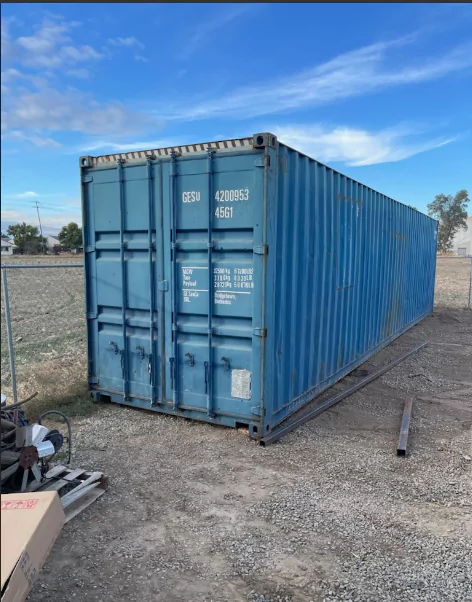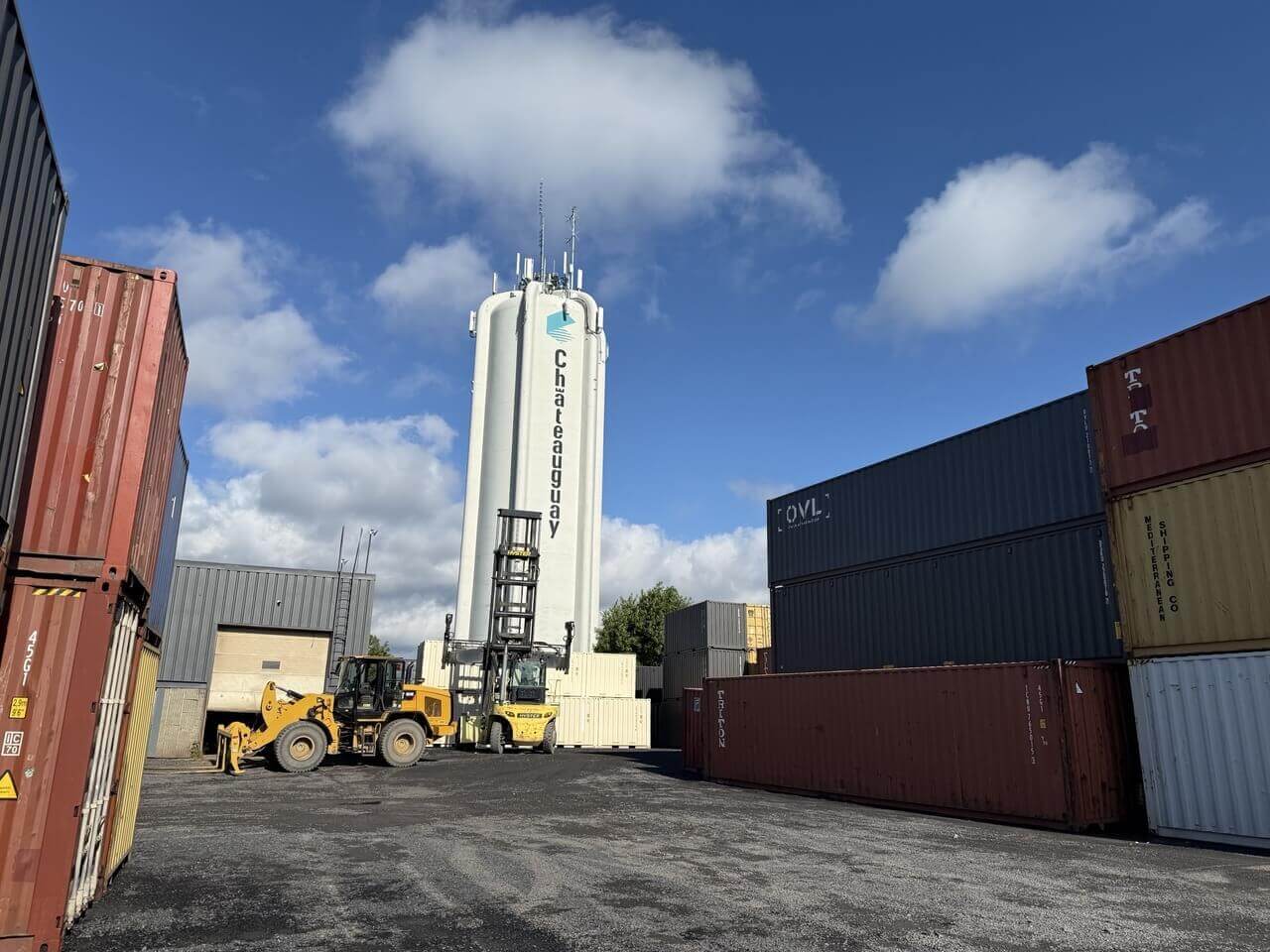Everything You Need to Find Out About Shipping Containers and Their Practical Applications
Shipping containers have actually evolved from simple tools for transport to flexible structures with various practical applications. Their durable layout and common sizing make them ideal for a range of usages beyond delivery. From innovative housing remedies to lasting farming, their versatility is noteworthy. The possibilities do not end there. Discovering their different functions discloses unusual understandings right into modern obstacles and imaginative options. What other duties could these containers play in today's world?
The Layout and Framework of Shipping Containers

Internally, containers are made to make the most of space, often including wood or steel flooring that can sustain significant weight. Air flow systems might be integrated to avoid wetness build-up, which is essential for delicate cargo. In addition, reinforced edges permit very easy handling by cranes and forklifts, facilitating seamless loading and discharging. This thoughtful layout and framework contribute to the containers' adaptability throughout various delivery and storage space applications.
Advantages of Utilizing Shipping Containers
While many transport techniques have their advantages, the use of shipping containers attracts attention as a result of their unequaled adaptability and efficiency. Shipping containers supply a standard dimension, making them very easy to pile and deliver throughout various modes of transportation, including vehicles, ships, and trains. This standardization minimizes packing and unloading times, therefore enhancing overall efficiency.
Shipping containers are built from sturdy materials, supplying durable defense for items throughout transit. They are safe and weather-resistant, reducing the danger of damages from ecological elements or theft. Furthermore, the modular layout of delivery containers permits simple modification, making it possible for companies to adjust them for various functions, such as storage space or mobile workplaces.
Their mobility and cost-effectiveness make shipping containers an eye-catching choice for companies looking to improve logistics and supply chain operations. These benefits contribute to the growing popularity of delivery containers in numerous industries.
Creative Real Estate Solutions With Shipping Containers
Innovative real estate remedies have emerged as an amazing application of shipping containers, leveraging their integral toughness for property usage. These functional frameworks supply a sustainable alternative to conventional structure products, usually at a fraction of the price. Architects and designers have actually transformed containers right into stylish, useful homes, dealing with diverse way of livings and preferences.

In addition, shipping containers are eco friendly, advertising recycling and reducing waste. Lots of jobs focus on energy efficiency, including eco-friendly roofs and solar panels. As urbanization increases, these cutting-edge real estate options provide a sensible reaction to real estate scarcities while cultivating an one-of-a-kind building visual.
Shipping Containers in Retail and Pop-Up Shops
A growing number of retailers are transforming to shipping containers as a dynamic remedy for retail spaces and pop-up stores. These flexible structures supply an affordable choice to conventional shops, enabling services to create unique, eye-catching settings that draw in consumers. Their modular design enables very easy transport and setup, making them perfect for seasonal or short-lived retail locations.
Retailers can tailor delivery containers to mirror their brand identity, transforming them right into aesthetically appealing stores that stand out in crowded markets. The compact nature of containers additionally urges reliable usage of space, permitting imaginative formats that optimize customer flow and engagement. Furthermore, delivering containers can be situated hop over to here in unconventional locations, such as uninhabited lots or metropolitan parks, raising accessibility and foot website traffic.
As the retail landscape evolves, delivering containers supply a ingenious and flexible remedy that satisfies the demands of contemporary customers while boosting the buying experience.
Lasting Farming Practices Making Use Of Shipping Containers
Lasting farming techniques increasingly integrate delivery containers as ingenious services for agriculture - Shipping Containers for Sale. These container visite site farms utilize hydroponics to make best use of space and source efficiency, supplying an affordable method to food production. By transforming shipping containers into farming hubs, farmers can address food safety and ecological concerns at the same time
Container Farming Conveniences
While conventional agriculture deals with obstacles such as land scarcity and climate change, container farming presents a feasible choice that makes the most of area and resources. This ingenious approach permits year-round crop production in regulated environments, minimizing reliance on climate conditions. Container ranches utilize less water than traditional farming, promoting sustainability and preservation. They can be established in urban locations, bringing fresh produce closer to consumers and lowering transport emissions. In addition, the modular nature of delivery containers enables scalability, allowing farmers to adjust procedures based upon demand. Container farming likewise decreases chemical use by producing an enclosed ecological community, inevitably enhancing food safety and security. As metropolitan populaces grow, container farming arises as a functional service to fulfill the boosting demand for neighborhood, sustainable food sources.
Hydroponics in Containers
Hydroponics, which enables plants to expand without dirt by utilizing nutrient-rich water, thrives within the boundaries of delivery containers, making it a suitable technique for metropolitan farming. These containers produce a controlled environment that enhances moisture, temperature level, and light, enabling year-round farming. With minimal area in city areas, delivering containers offer a scalable service for growing fresh fruit and vegetables. Hydroponic systems within containers can include different strategies, such as nutrient movie strategy (NFT) and deep water culture (DWC), which take full advantage of yield while lessening water use. This cutting-edge approach not just boosts food protection yet likewise lowers the carbon impact related to conventional farming methods. Hydroponics in containers represents a forward-thinking solution for sustainable metropolitan food production.
Economical Agriculture Solutions
As food manufacturing deals with enhancing challenges as a result of climate adjustment and urbanization, shipping containers arise as an economical option for farming. These flexible frameworks can be repurposed for various lasting farming techniques, such as hydroponics and vertical farming. By utilizing controlled atmospheres within containers, farmers can optimize development cycles and reduce resource consumption, including water and plant foods. Additionally, shipping containers can be tactically put in urban locations, minimizing transportation prices and enhancing accessibility to fresh fruit and vegetables. Their modular nature enables scalability, making it possible for farmers to broaden procedures as demand grows. Repurposing containers contributes to throw away reduction, lining up with environmentally friendly farming campaigns. On the whole, shipping containers present ingenious opportunities for reliable and sustainable food manufacturing.
Emergency and Calamity Relief Applications of Shipping Containers

Organizations frequently make use of shipping containers to create mobile clinics or area healthcare facilities, making sure that treatment gets to those in requirement. Additionally, they can be transformed right into command facilities for collaborating rescue procedures, consequently boosting organizational performance during crises.
Containers can be customized to keep crucial items such as water, food, and clothes, securing materials till they are distributed. Their mobility permits them to be quickly delivered to various places, making sure that assistance shows up where it is most quickly required. In general, delivery containers play a crucial function in boosting the effectiveness of calamity relief efforts worldwide.
Often Asked Inquiries
Just How Are Shipping Containers Transported From One Area to One More?
Shipping containers are delivered by means of vehicles, trains, and ships, using cranes for dumping and packing. This multi-modal transportation system guarantees effective motion across land and sea, attaching global supply chains and promoting international trade.
What Is the Average Life-span of a Delivery Container?
The typical lifespan of a delivery container typically ranges from 10 to 25 years, depending upon maintenance, usage, and ecological aspects. Appropriate treatment can expand their use, while neglect might result in damage and damages.
Can Shipping Containers Be Changed for Different Uses?
Yes, shipping containers can be modified for numerous usages. They work as homes, offices, pop-up stores, and storage units. Their versatility permits imaginative adjustments, making them appropriate for a broad range of applications.
Are Shipping Containers Eco-friendly?
Shipping containers can be eco-friendly, as they promote reusing and repurposing. Their toughness lowers waste, while their usage in different real estate and services decreases the demand for brand-new materials, adding to sustainable techniques.
How Do I Pick the Right Size Shipping Container?
To select the ideal size delivery container, one have to assess storage space requirements, consider the intended use, and review space schedule - shipping containers for sale near me. Usual sizes include 40-foot and 20-foot containers, each offering various storage and transportation demands properly
Innovative housing remedies have actually emerged as an amazing application of delivery containers, leveraging their fundamental toughness for household use. The adaptability of delivery containers enables for imaginative layouts, from single-unit homes to complicated multi-container setups. Sustainable farming practices progressively incorporate delivery containers as cutting-edge solutions for farming. Additionally, the modular nature of delivery containers allows scalability, permitting farmers to change procedures based on demand. Hydroponics, which enables plants to grow without soil by using nutrient-rich water, grows within the confines of shipping containers, making it an optimal technique for metropolitan farming.